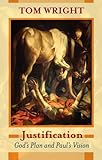There has been a little bit of evangelical in-fighting going on recently. Many in the traditionally reformed camp have criticized the theology of justification that N.T. Wright (and other NT scholars of his ilk) espouse. John Piper wrote a book summarizing these criticisms, and N.T. Wright replied to Piper’s book with the one I am here reviewing.
In this book, Wright attempts to define Paul’s doctrine of justification. He touches on other themes of Paul’s theology, but by and large stays focused on justification. His views are a part of an increasing number of scholars who hold to what has been called the ‘New Perspective on Paul’ or ‘New Perspectives on Paul’.
In his attempt to define justification, Wright focus heavily on Paul’s context. He stresses Israel’s continued exilic state, God’s covenant with Abraham, righteousness as covenantal faithfulness, the Trinitarian work of God in salvation, Israel’s calling as a calling to bless the whole world, and the coming together of Jews and Gentiles as foundational to understanding what Paul is trying to say. Throughout the book, Wright continually strives to fit all parts of Paul’s theology together into a coherent whole. Wright regularly strives for this over-arching meta-narrative or controlling theology. He believes its cohesion is reflective of one’s interpretive accuracy. Or in other words, the better each interpretation of an individual passage fits into your overall understanding of what Paul is saying the more likely you have rightly understood him. He challenges his critics to evaluate their interpretations in light of this standard.
Here are some summary quotes from the book:
And that, in turn is why the Messiah’s death under the curse of the law (Gal 3.13) is much, much more than a simplistic exchange (‘we were under the curse; he took it; we go free’), but rather the rich Pauline logic: God’s promises to Abraham were stuck in the Deuteronomic curse, and could not go forward in history to their fulfilment; the Messiah came and bore the covenantal curse in himself, so that the new covenant blessings might flow out at last to the world–and of course to Israel as well. (page. 114)
The problem with the single-plan-through-Israel-for-the-world was that Israel had failed to deliver. There was nothing wrong with the plan, or with the Torah on which it was based. The problem was in Israel itself. As we shall see later, the problem was that Israel, too, was ‘in Adam’. (page 171)
That is what Romans 6 is all about. Paul does not say, ‘I am in Christ; Christ has obeyed the Torah; therefore God regards me as though I had obeyed the Torah.’ He says: ‘I am in Christ; Christ has died and been raised; therefore God regards me — and I must learn to regard myself — as someone who has died to sin and been raised to newness of life.’ (page 205)
Justification by faith — God’s declaration in the present time that all those who believe that God raised Jesus from the dead, all those who confess him as Lord, are true members in the renewed covenant, and are assured thereby of final salvation — belongs inextricably, for the reasons now abundantly given, within the framework of Paul’s vision of God’s single plan of salvation, through Israel and hence through Israel’s Messiah, for the sake of all the nations and ultimately of the whole cosmos. (page. 218)
As you can sense from these quotes, Wright understands what Jesus did as rooted in the story of Israel. He also sees the Christian community as the continuation of this narrative. Because so much of his understanding of justification is rooted in God’s promise to Abraham, he sees the Christian community as the seed of Abraham, the new Israel.
I very much enjoyed this book. I found myself reading through the different sections with eagerness and excitement. He is a compelling and persuasive writer. My own understanding of Paul increased. My appreciation for the work of Christ was enhanced. And, my desire to live into my Christian calling as Abraham’s seed called to bless the world was emboldened. For a book that is intrinsically polemical, I was surprisingly edified!
